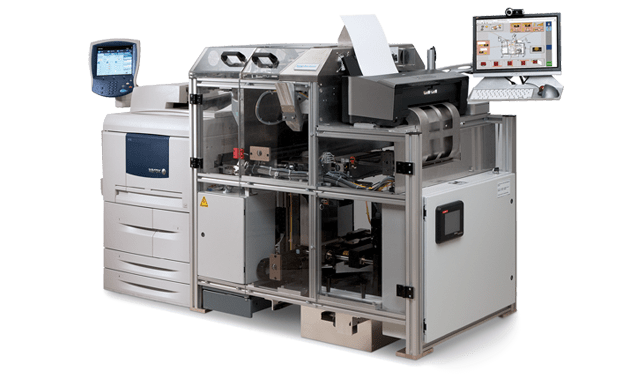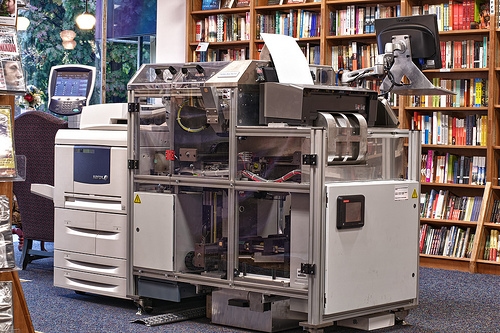Print-On-Demand Is Not and Never Will Be the Silver Bullet Which Slays Amazon


Under the clickbait headline that Amazon should beware POD, Worldcrunch reported late last month on a couple new POD machines installed in France:
This was without a doubt one of the main attractions of this week’s 35th annual Paris Book Fair. Two renowned publishers in France, La Martinière and Presses Universitaires de France (PUF), have publicly introduced two machines that readers can use to print their own copy of a book in real time.
The Espresso Book Machine, presented by PUF, is an American technology that’s been around for 10 years. And at La Martinière’s stand, Orséry co-founder and chairman Christian Vié offers his "solution for printing books in bookstores," which uses machines by Japanese firm Ricoh, the world leader for photocopying machines.
The technology is ripe. For example, it is now possible to print — in just seven minutes — the 220 pages of Edouard Louis' novel En finir avec Eddy Bellegueule, one of France’s most successful 2014 fiction books with more than 200,000 copies sold.
The article doesn’t explain why Amazon should be afraid of POD, but that doesn’t mean the article is entirely wrong.
Amazon is wary of print-on-demand, which is why the retailer has invested so much money in the technology. It was ten years ago, almost to the month, that Amazon bought a book POD service called Booksurge.
Booksurge was later merged with Createspace (then a DVD POD service), and as a result Amazon is now one of the major POD services (along with Lightning Source). And that means that far from being wary of POD, Amazon is actually in the forefront of what may or may not be the next important publishing tech.
But to be honest, I’m not convinced that POD will be the next wave – at least not the retail type of POD that WC is talking about.
Amazon’s main focus in POD is in commercial facilities (book factories, more or less) while most of the hype surrounding POD is expressed in terms of bookstores and other retail locations.
And that’s weird, because there aren’t very many POD machines installed in bookstores; even if you count the ones installed in libraries and universities, the number is still quite small.
The Espresso Book Machine, a POD device from On Demand Books, has been around for nearly as long as Booksurge, and yet it is still an uncommon sight in bookstores. According to Lauren Lung of ODB, by the end of 2014 about 100 Espresso Book Machines had been installed in retail outlets around the world.
Here’s one in operation:
In comparison, Kodak’s photo printing equipment (a similar concept in POD) can be found in just about every drug store in the US. It’s hard to say why Kodak’s machines are more common, but I would bet that the cause stems from Kodak knowing their market.
As anyone can tell you, Kodak’s photo POD machines are installed so people can get their own photos made. But if you ask the same question about book POD machines in bookstores, most people will talk about them being used to sell commercial books.
Here’s the fun part: consumers aren’t using book POD machines to buy books in bookstores.
As has been shown time and again, consumers aren’t going to their local POD machine to buy commercial books; they’re using the POD process to turn their own content into a physical book.
Consumers are going to their local bookstore and using the book POD equipment for exactly the same reason they would use Kodak’s equipment: they are printing their own creations.
And that brings me to perhaps the biggest reason why POD is no threat to Amazon: consumers aren’t going for it. Instead, they’re content to buy books the old-fashioned way.
You can blame that on fast shipping times for online purchases, the fact that immediacy has rarely been an issue for consumer book purchases, and the excess of used books available online.
Consumers aren’t buying books from the POD machine in their local bookstore because most of the time they don’t absolutely have to get the book right this second, so they instead choose the cheaper option of buying the book online. Or, they might choose to get a hardback instead (most POD machines only do paperback books).
All in all, POD is fascinating tech, but it is no threat to Amazon. (If it were a threat, Amazon would have bought On Demand Books by now – or launched a competing POD machine.) Anyone who says otherwise is trying to sell you something.
images by Politics and Prose Bookstore, Jeffrey Beall



Comments
Jon Jermey May 2, 2015 um 5:39 pm
In the time it would take me to locate a store with a POD machine, get there, queue for service, get them to set up my book, have it printed and bound and go home again, I could have printed three or four books on my home laser printer for a lower price. And there are plenty of places that will bind them for me, including the local newsagency that I pass every day. If print has a future at all, it’s in cheaper laser printers and cheaper renewables, not expensive centralised machines.
Nate Hoffelder May 3, 2015 um 7:27 am
And then there is that issue. You’re right, the machinery isn’t nearly ubiquitous enough for the buying process to be convenient.
jjj May 2, 2015 um 6:27 pm
Sounds morel like a threat to bookstores.
Why put a POD in a bookstore to begin with?
Why not in a park or a train station, beaches and cruise ships, hospitals and .. everywhere.It would have to be autonomous but that might not be that hard.
Amazon likely wants it for faster delivery, if they can print it locally so depending on the financials it could help them too.
And it has no relevant impact on ebooks.
if book stores had trucks with mobile PODs and they could deliver books faster than pizza,then maybe that would be a significant advantage and Amazon would have to copy it. No idea if there are such services and if demand would be high enough for the service to make sense. Guess demand would have to be defined per square mile and unit of time.
Nate Hoffelder May 3, 2015 um 7:32 am
Yep. And that is why I think Amazon is working on such an autonomous POD machine.
Bob W May 3, 2015 um 9:24 am
All they have to do is figure out how to strap it to a bicycle so that kids can drive them through the neighbourhoods and sell books like ice cream. Then maybe Amazon will be a little worried.
Caleb Mason May 3, 2015 um 6:22 pm
Kodak and actually Fuji with far more, have these in drug stores because photo retail disappeared in the 1990s. Ritz camera, Fotomat, etc. Went out of business because selling photos on their own was not a sustainable retail business as volumes and technologies changed. So the question is the same for books. Are stores dedicated to them sustainable? The trends of the past 20 years show they are not. So where and how will you get a wide selection of printed books when there is no B&N and far fewer bookstores? I believe the answer is via mail from either Amazon or a POD machine in coffee shops, copy centers, Staples, supermarkets, and other places with lots of product categories, not just one.
Nate Hoffelder May 4, 2015 um 12:28 am
I’ve never lived in a place with photo retail. Instead, we always dropped off out film to be developed. That’s why I see the Kodak and Fiju machines as an outgrowth of the drop-off bins all those stores had anyway.
Far from the model not being sustainable, the machines forced out the standalone operations because they were cheaper than hiring people.
Publishing Tales: Stories about Literature from across the Web (May 2 – May 9) May 10, 2015 um 8:36 pm
[…] Print-On-Demand Is not and Never Will Be the Silver Bullet Which Slays Amazon […]
This is not why I believe in POD | Making Book May 11, 2015 um 1:38 pm
[…] Ink, Bits, & Pixels is also a bit skeptical. I’m quite sure that the Espresso machine is not going to be anybody’s silver bullet. There’s a place for it, but surely not a huge one. The video in this post shows you the painfully deliberate operation of the machine: miraculous if you compare it to getting a copy of the book via special order through snail mail, but ludicrous when you see a commercial POD operation at full pitch. Still, there are applications, and it’s nice to see that Digital Books has managed to get a couple of French installations. […]